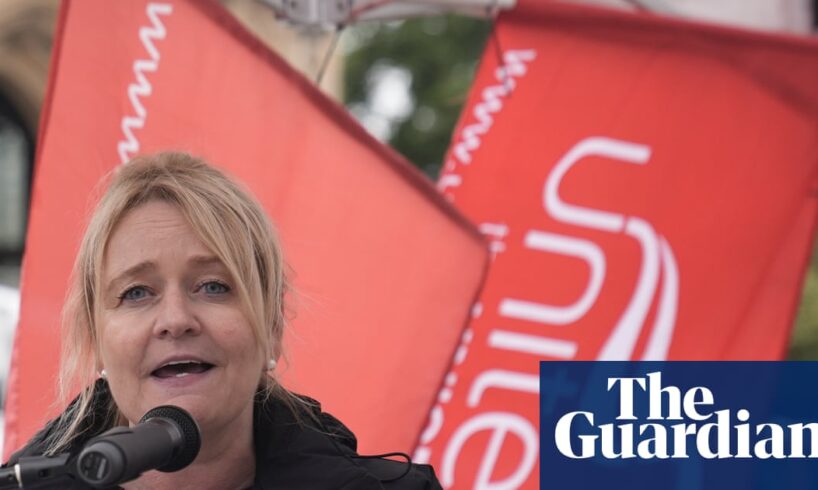
Labour’s most powerful union backer has warned that Keir Starmer is in danger of bolstering support for Nigel Farage, arguing that the government has failed to support oil and gas workers and watered down plans to boost employment rights.
Sharon Graham, the general secretary of Unite, said voters could be left feeling “duped” by Labour after the government scaled back planned changes to ban zero-hours contracts and exploitative “fire-and-rehire” practices.
As polls show Reform UK on course to become the largest party in the next parliament, the leader of the UK’s largest private sector union said Labour had not adopted its proposals to create new jobs for workers in fossil fuel industries.
Speaking to the Guardian before the start of the annual TUC conference on Sunday, Graham said Labour had a short time to turn things around or see support from union members leach away to other parties.
“They have one year to get this right because Nigel Farage is on their tail.
“And don’t get me wrong, Farage is not the answer, but he is a good communicator. And whether we like it or not, when he is talking about net zero, and about what’s happened to communities and workers, people are hearing what Labour used to say.”
She said that, with high inflation already taking a toll on household budgets, mooted tax rises in Rachel Reeves’s autumn budget would be the final straw for many Labour voters.
Graham said Labour needed to avoid taxing workers to fill the gap in the public finances and start drawing up plans for a wealth tax.
“If this keeps happening, the feeling that workers always pay, but they’re leaving the super-rich totally untouched – I think they won’t recover from it,” she said.
Sharon Graham says when Nigel Farage is talking about net zero, and about what’s happened to communities, ‘people are hearing what Labour used to say’. Photograph: Kevin Dietsch/Getty
Echoing the Trades Union Congress general secretary Paul Nowak’s call for higher taxes on the richest households, she said: “[Labour] were very front foot forward with winter fuel. Now they should say absolutely [a wealth tax] is a good idea.”
Anger at Labour ministers from inside Unite’s ranks was high, she said, bringing the union close to cutting off party funds.
The fate of 30,000 workers in the oil and gas industry features on Graham’s list of priorities after a year spent trying to convince the energy secretary, Ed Miliband, that he should put more effort bringing green jobs to the UK.
He said: “Green jobs are not delivery workers on an electric scooter. I am talking about people in the oil and gas industry making the switch to green energy jobs.”
She said Unite had put forward proposals for investments in making sustainable aviation fuels and wind turbines to Miliband that had gained little traction.
There would be an almost unanimous vote to block further donations to Labour if a vote on the union’s political levy were held today, she said.
Earlier this year, its members overwhelmingly voted to suspend Angela Rayner’s membership over the former deputy prime minister’s “support for pay cuts” to striking Birmingham bin collectors.
skip past newsletter promotion
Sign up to Business Today
Get set for the working day – we’ll point you to all the business news and analysis you need every morning
Privacy Notice: Newsletters may contain information about charities, online ads, and content funded by outside parties. If you do not have an account, we will create a guest account for you on theguardian.com to send you this newsletter. You can complete full registration at any time. For more information about how we use your data see our Privacy Policy. We use Google reCaptcha to protect our website and the Google Privacy Policy and Terms of Service apply.
after newsletter promotion
The strike could continue for another six months after bin workers voted this week for pay cuts of up to £8,000 to be reinstated.
When it suspended her membership, Unite said Rayner had backed special commissioners appointed by her department against Birmingham city council’s management, who were prepared to end the dispute.
Graham said anger boiled over when the government amended the employment rights bill (ERB) to allow councils to fire and rehire workers.
Under the amendments, councils will gain the ability to sack and rehire workers on worse pay and conditions if they are in financial distress – an opt-out already secured by private sector organisations.
The ERB is expected to be agreed by MPs later this year and take effect from next spring, with elements such as the implementation of day-one rights to sick pay and unfair dismissal protections delayed until 2026.
Extra powers for unions to recruit new members and gain collective bargaining rights will be on the statute books from April 2026, allowing access for those at companies that have locked out unions for decades, including Amazon.
Employers organisations are upset by clauses in the legislation that reduce the thresholds for unions to gain recognition agreements.
Graham said Labour had watered down previous “no ifs, no buts” commitments and allowed employers to ultimately refuse access, forcing unions to embark on lengthy appeals.
“Most blue-chip companies allow access to trade unions and negotiate with them. It is the hostile employers that don’t. And if you look at the collective bargaining pieces in the ERB there isn’t much to grab hold of,” she said.





